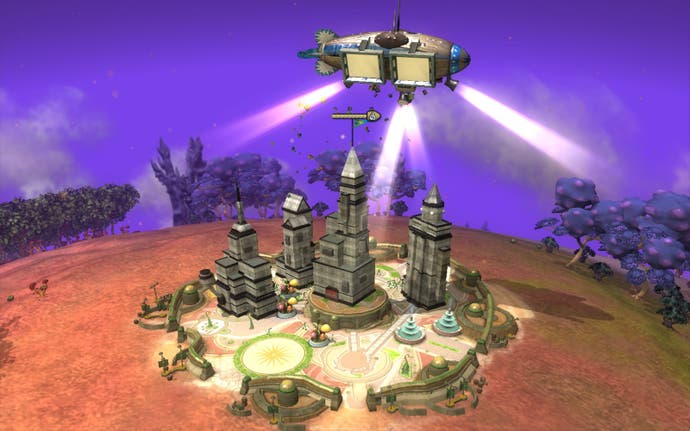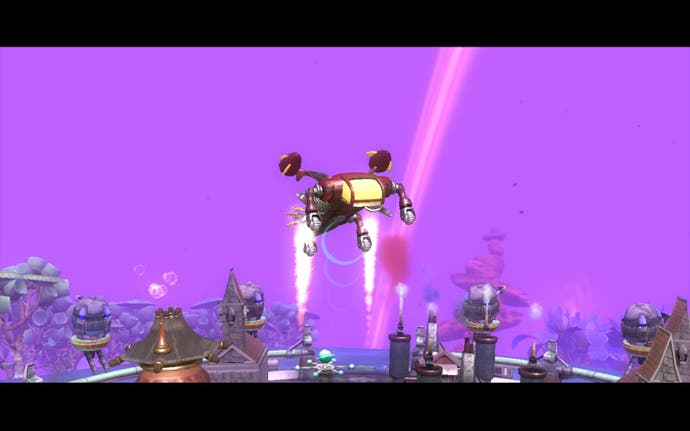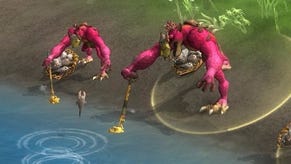Spore
Gene cool.
The procedural music generator, courtesy of Brian Eno, has received a fair amount of attention. Here, it allows you to create a distinctive anthem for your society via a simple set of adjustable parameters. A line of notes illustrates the melody: this can be randomised with a single-click, or fine-tuned by dragging each individual note vertically, which moves it up or down the scale. The colour of the notes reflect their harmonic nature in the context of the key of the tune: red for dissonance, green for consonance. The timbre of the theme can be further altered by selecting from a range of backing tracks.
It's a little fiddly at first, but an impressive technical achievement; and with a little patience, I'd like to think I will ultimately be able to Rick Roll rival cities into submission.
Your society is either Military, Economic or Religious, which impacts greatly on how you can achieve the end goal here of seizing control of the entire planet. As a religious society, for instance, you can target unhappy cities and attempt to convert them to your cause using a special power. This is represented by the unleashing of amusing holographic tele-evangelists around the perimeter of your walls, brow-beating them into submission. Although only scratching the surface, it's the first phase I've encountered where it's plausible to imagine more seasoned gamers spending a great deal of time experimenting.
Access to the Space phase is granted when your civilisation has advanced to the point where it has designed space craft. This is the end game and where the majority of Spore players will spend the bulk of their time.
There are nine different archetypes for this phase, such as Warrior, Trader and Shaman, yours determined by the way you have played through the game. Emerge from the Civilization phase as an economic power, for instance, and you become a space-faring diplomat.
One of Spore's best features is the timeline: this stores up all of the significant events that have happened during the evolution of your species, stretching across the billions of years from cellular organism to space age civilisation. It's a brilliant, instant visual history of your journey through the game, and also shows how the choices you made have directed the course of evolution.
You have to earn access to the entire galaxy. The Space phase leads you by the hand initially with a series of missions designed to familiarise you with ship construction (as superbly satisfying as the other editors), flight, exploration of other planets and so on.

Ultimately, if you take the game seriously, it becomes about learning to create successful colonies, managing the atmosphere and biosphere of individual worlds, creating and maintaining species, transforming inhospitable worlds into fecund cradles of life, or exploding entire planets just for the hell of it.
Global warming is simulated on a planetary level, and overheating results in rising sea levels, the extinction of species, and oceans can evaporate on the path to total meltdown, for example.
As Wright explains: "It's an exaggerated version of what might happen on Earth. But playing with these toys you get some sense of how fragile an ecosystem can be, and how much life can actually stabilise the life on a planet."
Planets can be changed through terraforming as you acquire the necessary tools. You can create a volcano, for instance, to change the atmosphere of a world, and pulling back you actually see it gradually thickening.
Wright wants you to get a feel for what a galaxy is really like, and his team has gone to extreme lengths to realise this vision. To take a single example, once you unlock the Wormhole Key, you are able to use black holes like a subway system to traverse great chunks of space. On seeking out black holes, Wright advises: "Usually the best way to look for a black hole, oddly enough, is through the gravitational lensing.

"We wanted to have a lot of the same things you would see through the Hubble telescope appear with fairly reasonable frequency in the game. We wanted to convey how huge and massive a galaxy really is." Mission accomplished.
As noted, the Space phase is where you will probably spend the overwhelming majority of your time in the game proper - although one of the more intriguing aspects of the title is that there will likely be many users who barely bother with the game, preferring to tinker endlessly with the creation tools and content sharing functionality.
Zooming right out to the galactic viewpoint for the first time is a real wow moment, and there's a palpable sense of wonder about the endless solar systems stretching out into infinity, each awaiting discovery and populated by a unique and unpredictable array of species created by you and I. If you run into Kylie, say hi.
So, is it fun? Absolutely. Whether this sense of wonderment can extend and translate into an engaging, rewarding long term experience becomes the critical question. With just a few hours' frantic dabbling, questions remain over the relative strengths of the various phases, answers to which will arrive with review code in the next few weeks.
But when taken as a whole, there are at the very least intimations of greatness. It's a remarkable achievement. And having dedicated over seven years of his life to creating Spore, you can hardly blame Will Wright for wanting to lie down.










